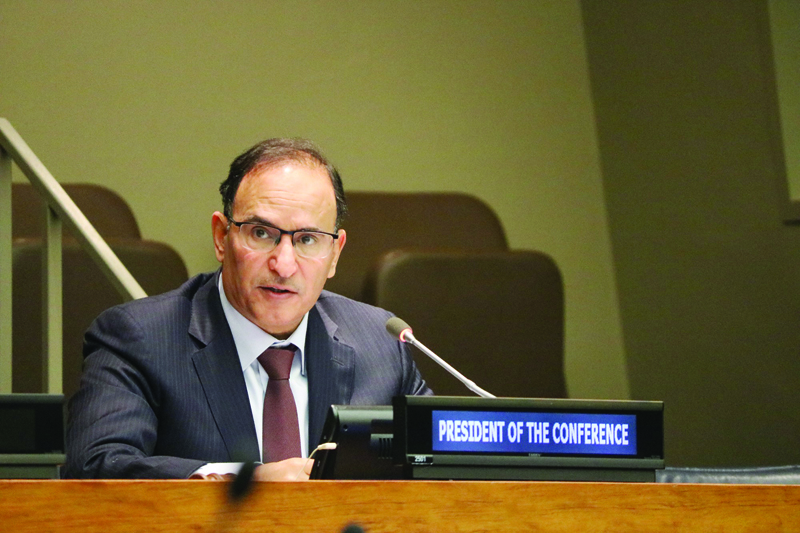 NEW YORK: Kuwait's Permanent Representative to the UN Headquarters in New York Ambassador Mansour Al-Otaibi addresses the Second Session of the Conference on the Establishment of a Middle East Zone Free of Nuclear Weapons and Other Weapons of Mass Destruction. - KUNA
NEW YORK: Kuwait's Permanent Representative to the UN Headquarters in New York Ambassador Mansour Al-Otaibi addresses the Second Session of the Conference on the Establishment of a Middle East Zone Free of Nuclear Weapons and Other Weapons of Mass Destruction. - KUNA
NEW YORK: There will be no peace, security, or stability unless the world is rid of nuclear arsenal and Weapons of Mass Destruction (WMD), a senior Kuwaiti diplomat said late Monday. Speaking to the Second Session of the Conference on the Establishment of a Middle East Zone Free of Nuclear Weapons and Other Weapons of Mass Destruction, Kuwait's Permanent Representative to the UN Headquarters in New York Ambassador Mansour Al-Otaibi said that his country would continue to adopt measures to lessen the usage of such weapons against humanity. He affirmed that Kuwait, as President of the current session, urged countries with influence in the region to take responsibility and join the Treaty of Non-Proliferation Treaty of Nuclear Weapons (NPT) signed in 1995.
Ambassador Otaibi added that Kuwait was against the spread of all kinds of conventional and nuclear weapons of destruction, partaking in all global efforts by the UN and other organizations to halt their spread regionally and internationally. He reiterated calls for Zionist to join the NPT, underlining that the Zionist were the only group in the Middle East who refused to contribute to the region's stability due to the presence of their nuclear arsenal and stockpile.
Arab countries had contribute to the decision in 1995 to have a Middle East clear of WMDs and nuclear arsenal, indicated Ambassador Otaibi, adding that 2010 review conference had ratified a work plan to implement resolutions concerning clearing Middle East from such weapons. The Kuwaiti diplomat expressed sorrow of the lack of determination in regards to clearing the region from Nuclear weapons, saying that sides like Zionist specifically continue to thwart any efforts in this regard preventing reviews of the NPT in 2015 to implement the tenets of the agreement.
He went on to say that, there was still a determination towards achieving the goal of a nuclear weapons-free Middle East, which involved all facilities being inspected by the International Atomic Energy Agency (IAEA) to make sure that they were abiding by the NPT and other agreements. He expressed hopes that the current session would provide positive results in the quest to protect the region from hazardous weapons be it nuclear or other.
Prior to the session, Ambassador Otaibi said that the five-day conference, held at the UN headquarters, aimed to pave the way for turning the Middle East into a region free from nuclear and mass destruction weapons similar to those created in South America, Africa, Southeast Asia, Pacific and Central Asia. Meanwhile, Ambassador Otaibi expressed, on the international day to support the Palestinian people, solidarity with his Palestinian brethren and their quest to establish an independent state with East Jerusalem as its capital.
Lasting peace
UN Secretary General Antonio Guterres has lauded Kuwait's efforts to prove successful the second session of the Conference on the Establishment of a Middle East Zone Free of Nuclear Weapons and Other Weapons of Mass Destruction. "I commend the Presidency of the second session, the State of Kuwait, for actively engaging participants during the intersessional period to learn from the other nuclear-weapon-free zones and continue moving the process forward," the UN official said at the inaugural session which was held in New York earlier Monday. He also extended warm congratulations to Kuwait's Permanent Representative Ambassador Otaibi for his election as the President of the five-day conference.
Guterres stressed that establishing Middle East as Nuclear-Weapon-Free Zone will help bring lasting peace to the chronically strife-torn region and make the world a safer, more secure place. "States must join forces and seek every opportunity to ease tensions, resolve conflicts and build lasting peace and security. This Conference represents one such initiative and could bring tangible benefits to the Middle East region and beyond," he said.
The Conference, which aims to form a legally binding treaty to establish the zone, was first held in November 2019, following a request for such a gathering at the 1995 Review and Extension Conference of the Parties to the Treaty on the Non-Proliferation of Nuclear Weapons. The Secretary-General noted that since 1967, five nuclear-weapon-free zones have been declared worldwide, including 60 percent of Member States and covering almost all of the southern hemisphere.
Expanding such zones to more regions will strengthen global nuclear disarmament and non-proliferation norms. It will also contribute to building a safer world, particularly in the Middle East where concerns over nuclear programs persist, and conflicts and civil wars are causing widespread civilian casualties and suffering, undermining stability and disrupting socioeconomic development. "I reiterate my call upon all parties to exercise restraint and avoid escalation," he said, emphasizing that the return to dialogue for the full implementation of the Joint Comprehensive Program of Action is an important step.
Further, the perpetrators of chemical attacks must be identified and held accountable. Achieving a nuclear-weapon-free zone will eliminate the possibility of nuclear conflicts in the region and strengthen international bans on chemical and biological weapons, he said. It will also deescalate regional arms races and free up much-needed resources to tackle COVID-19 and climate change, and achieving the Sustainable Development Goals, he added, calling for strong political will and international community support to transform the vision of a nuclear-weapon-free zone in the Middle East into a reality. - KUNA
.jpg)



